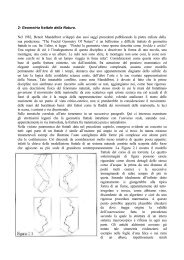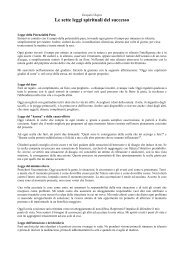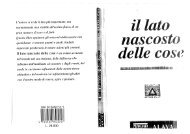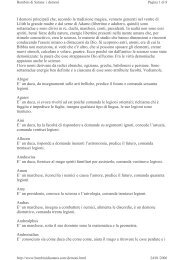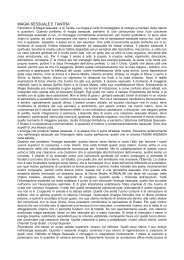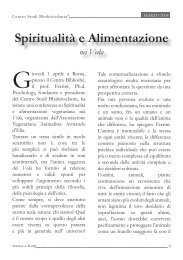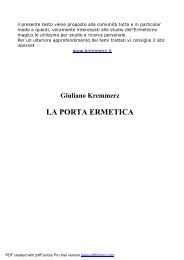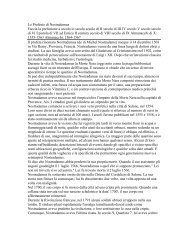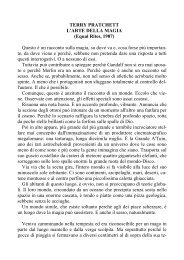152 TALIBANtwo chapters, sucked in the Taliban and the other Afghan warlords. ThusAfghanistan became the fulcrum of the first battle of the new GreatGame.Weak and impoverished and with no military force to defend its longborders with Iran, Afghanistan and its rival Uzbekistan, Turkmenistanopted for a foreign policy of neutrality. This gave the Turkmens the justificationto keep their distance from Russia and avoid being sucked intothe economic and military pacts that arose out of the break up of theSoviet Union. Neutrality also allowed Ashkhabad to avoid taking sidesin the Afghan conflict, which angered Moscow and Tashkent as Turkmenistanrefused to join the anti-Taliban alliance. Ashkhabad had providedthe communist regime in Afghanistan with diesel fuel until Kabulfell in 1992. It proceeded to do the same for Ismael Khan who controlledHerat until 1995 and later the Taliban. While the Turkmen Consulatein Herat maintained good relations with the Taliban, its Consulate inMazar did the same with the anti-Taliban alliance. Turkmenistan was theonly CAR that wooed the Taliban rather than confronted them.Like his Central Asian counterparts, Niyazov was a severe autocraticruler, allowing no political opposition, censoring the media and maintainingstate control over the economy. He developed a crude personalitycult in the Stalinist mode, with his portraits and statues on display everywhere.An entire government department was set up to disseminate thePresident's pictures. Niyazov, like his rival Karimov, was an orphan. Bothwere bought up in communist orphanages and joined their respectiveCommunist Parties at an early age, rising to become Secretary Generalwell before independence. Their education, upbringing and loyalties laywith the defunct communist system but they both learned to play thenew Great Game with skill.No country in the region has benefited more from the break up of theSoviet Union than Turkey. Russia has been Turkey's most potent enemyfor centuries. From the late seventeenth century to World War One,Turkey and Russia fought over a dozen wars and this rivalry had promptedTurkey to join NATO and try and become a member of the EU. However,the independence of the CARs suddenly awakened Turkey to itsmuch older historical legacy.Until 1991 Pan-Turkism - the idea of a Turkic homeland stretchingfrom the Mediterranean to China — was a romantic dream espoused by afew Turkish scholars and barely figured in Turkey's foreign policy agenda.Suddenly, after 1991, Pan-Turkism became an achievable reality and anintegral part of Turkey's foreign policy. Turkish dialects were now spokenby an accessible and vast contiguous belt that stretched from Istanbulacross the Caucasus and Central Asia to Xinjiang in China. The Gsaw Turkey as a model for their economic development — MuslimDICTATORS AND OIL BARONS ~ 153secular - while Turkey desired to expand its influence in the region andbecome a major player on the world stage.Turkey began to send massive aid to the CARs and the Caucasus -starting direct flights to their capitals, beaming TV programmes via satellite,offering thousands of scholarships to students, training their diplomats,soldiers and bankers and initiating an annual Pan-Turkic summit.Between 1992 and 1998 Turkish companies invested more than US$1.5billion in the region, becoming the single largest state investor. Turkeyalso realised that to be effective in Central Asia it had to placate Russiawhich it did by buying Russian gas and expanding trade with Russia,which rose from US$1.9 billion in 1990 to US$4.1 billion in 1997- 14 In1997, the EU's rejection of Turkey's membership angered the Turks, butalso pushed them into forging closer ties with the USA, Russia, Israel andCentral Asia.Turkey has become a major player in the new Great Game. Its needfor energy and desire to expand its influence prompted successive Turkishgovernments to push for becoming the principal route for Central Asianenergy exports. In the summer of 1997 the USA and Turkey jointly sponsoredthe idea of a 'transportation corridor' for a main oil pipeline fromBaku in Azerbaijan through Georgia and the Caucasus to Turkey'sCeyhan port on the Mediterranean. Kazakhstan and Turkmenistan wouldbe encouraged to feed their oil into this pipeline. This, the USA argued,would give the expensive and lengthy Baku-Ceyhan route the necessaryoil volumes to make the project financially viable. 15 The USA wantedTurkmenistan to build a gas pipeline under the Caspian Sea which wouldthen run along the Baku-Ceyhan corridor to Europe.The USA also urged Kazakhstan to commit to building a similar underthe-seaCaspian oil pipeline, so that Kazakh oil could be pumped alongthe Baku-Ceyhan corridor. Kazakhstan's vast oil reserves were beingexploited by two major Western oil consortiums in Tenghiz and Karachagnak,while China was developing a third oil-bearing region aroundUzen. 16 Kazakhstan already had one planned oil pipeline route fromTenghiz to the Russian port of Novorossiysk on the Black Sea, which wasbeing developed by Chevron, but the Baku-Ceyhan route would offer analternative that avoided Russia.The Azerbaijan International Operating Company (AIOC), made upof nearly a dozen of the world's oil companies and which dominated Azerbaijan'soil development, was averse to the Baku-Ceyhan route becauseit was too expensive, too long and would cross Turkey's volatile Kurdishregion. 17 By 1998 it was clear that US plans to develop the Afghanistanroute would be delayed and so the Baku-Ceyhan corridor became theniain plank of Washington's policy towards the Caspian region.The controversy over Baku-Ceyhan raged on for two years until late
154TALIBAN1998 when international oil prices crashed because of the slump indemand due to the Asian economic crisis. Oil prices sunk to a record lowof US$13 a barrel compared to US$25 in 1997, making it uneconomicalto immediately exploit Central Asian oil, which was both expensive toproduce and transport. The break-even price for Central Asian oil wasaround US$18 dollars a barrel- 18 Even though the Baku-Ceyhan routewas no longer viable commercially, Washington continued to pursue itsconstruction as it became the main plank of US policy in Central Asia.Turkey had backed the Afghan Mujaheddin in the 1980s, but its roleremained limited. However, as it developed a Pan-Turkic foreign policy,Ankhara began to actively support the Turkic minorities in Afghanistansuch as the Uzbeks. Ankhara provided financial support to GeneralDostum and twice gave him a home in exile. Turkey became vehementlyopposed to the Taliban, which had created new tensions with its closeally Pakistan. Moreover, the Taliban threat had also pushed Turkey intoa greater understanding with its regional rival Iran.Turkey also played a role in turning around Israel's policy in Afghanistan.Turkey and Israel had developed close military and strategic ties afterthe 1993 Oslo Accords. The Israelis and more significantly some Jewishlobbies in the USA were not initially critical of the Taliban. 19 In linewith the US State Department, Israel saw the Taliban as an anti-Iranianforce which could be used to undermine Iranian influence in Afghanistanand Central Asia. Moreover, the Unocal pipeline across Afghanistanwould impede Iran from developing its own pipelines from Central Asia.Israel's intelligence agency Mossad developed a dialogue with the Talibanthrough Taliban liason offices in the USA and with the oil companies.Pakistan's 1SI supported this dialogue. Even though Pakistan did notrecognize Israel, the ISI had developed links through the CIA withMossad during the Afghan jihad. With initial support from Turkey, Israelalso developed close diplomatic and economic links with Turkmenistan,Uzbekistan and Kazakhstan. Israeli companies invested in agriculture, theoil industry and communications.But as US policy towards the Taliban shifted so did Israel's, as theTaliban gave refuge to Bin Laden and encouraged the drugs trade. Turkeyconvinced Israel that the Taliban were a security threat to the region andcould export Islamic fundamentalism to Central Asia. As the Unocalproject evaporated and Israel realized the aversion its Central Asian alliesand Turkey had towards the Taliban, Mossad opened contacts with theanti-Taliban alliance. Israel now had an interest in seeing that the Tali'ban did not take control of the whole of Afghanistan, even though itremained suspicious of Ahmad Shah Masud's support from Iran. Both theTaliban and the Northern Alliance were to accuse each other of receivingIsraeli support.DICTATORS AND OIL BARONS ~ 155With oil prices crashing in 1999, Iran remained the wild card in thenew Great Game. Iran sits on the second largest gas reserves in the worldand has over 93 bb of proven oil reserves with current oil production at3.6 million/bd. As pipeline projects waned due to low oil prices, Iranstepped in to urge the CARs to export their oil through a direct northsouthpipeline to the Gulf via Iran. This could be built at a fraction of thecost of new pipelines across Turkey, because Iran already had an extensivepipeline network and only needed to add pipeline spurs to connect Iranwith Azerbaijan. 'The Iranian route for Central Asian oil is the safest,most economic and easiest. The total cost for Iran would be US$300,000.How does that compare with US$3 billion for a pipeline through Turkey?'Ali Majedi, Iran's Deputy Minister of Oil said in Tehran. 20 Moreover,Iran was also in competition with Turkmenistan to build a gas exportpipeline to India and Pakistan - a much more attractive route because itwould avoid Afghanistan. 21In the first phase of its programme, Iran proposed swapping its crudeoil with Central Asian crude. Since 1998 crude from Kazakhstan andTurkmenistan has been transported across the Caspian Sea to Iran's Caspianport of Neka, where it is refined and consumed in Iran. In exchangeIran allowed companies to lift oil from Iranian ports on the Gulf. Withpipeline projects indefinitely delayed, this appealed to the oil companieswho, despite US pressure not to do so, began to negotiate further swapswith Iran. Two US companies, Chevron and Mobil who have oil concessionsin Kazakhstan and Turkmenistan applied to the Clinton administrationin May 1998 for a license to carry out swaps with Iran - a move thatcreated a major policy headache for Washington and would become a testcase for the future of US sanctions against Iran. 22Ultimately the security needed to build pipelines from Central Asia toSouth Asia rested on ending the Afghan civil war. 'The CARs have twoproblems with Afghanistan. One is fear and the other is opportunity,'the UN mediator for Afghanistan Lakhdar Brahimi told me. 'Fear is therealization by these new and still fragile countries that the Afghan conflictcannot be contained for ever within its borders. Either it is resolved or itwill spill over into the CARs. They want to avoid adventures of anykind from Kabul, be it Islamic fundamentalism, terrorism or drugs. Theopportunity is that as landlocked countries who want to break theirdependence on Russia, they are looking south for oil and gas pipelinesand communication routes. They want a government in Kabul which isresponsible and is a good neighbour. They want to open their borders notclose them,' Brahimi added. 23Despite declining oil prices and Russia's desperate economic plight, thebattle of wills between the USA and Russia will dominate future pipelinecompetition. Russia remains adamant in keeping the USA out of its
- Page 1 and 2:
YALE NOTA BENE"The broader storyher
- Page 3 and 4:
TalibanMilitant Islam,Oil and Funda
- Page 5 and 6:
Vi ~ CONTENTSChapter 8A Vanished Ge
- Page 7 and 8:
AFGHANISTAN•^ UZBEKISTAN J TAJIKI
- Page 9 and 10:
2 ~ TALIBANaccounts for some 40 per
- Page 11 and 12:
"6 ~ TALIBANgas riches of landlocke
- Page 13 and 14:
10 ~ TALIBANgious mix that was to m
- Page 15 and 16:
Part 1History of theTaliban Movemen
- Page 17 and 18:
18 ~ ISLAM OIL AND THE NEW GREAT GA
- Page 19 and 20:
22 ~ ISLAM OIL AND THE NEW GREAT GA
- Page 21 and 22:
26 ~ ISLAM OIL AND THE NEW GREAT GA
- Page 23 and 24:
30 ~ ISLAM OIL AND THE NEW GREAT GA
- Page 25 and 26:
34 TALIBANKabul- Hikmetyar had alli
- Page 27 and 28:
38 ~ TALIBANrHERAT 1995: GOD'S INVI
- Page 29 and 30:
42 ~ TALIBANdo manage to take Kabul
- Page 31 and 32:
J46 ~ TALIBANgreater weight to UN e
- Page 33 and 34: 50 ~ TALIBANas they hung from steel
- Page 35 and 36: 54 ~ TALIBANthey would help rearm t
- Page 37 and 38: 58 TALIBANGul Mohammed Pahlawan, Gh
- Page 39 and 40: 62 TALIBAN2,500 Taliban, who had re
- Page 41 and 42: 66 TALIBANshould throw all aid agen
- Page 43 and 44: 70 ~ TALIBANyears of battle and hel
- Page 45 and 46: 74 ~ TALIBANThousands of Hazaras we
- Page 47 and 48: 78 TALIBANhas become a plague,' sai
- Page 49 and 50: NEW STYLE FUNDAMENTALISM OF THE TAL
- Page 51 and 52: 86 TALIBANsity students - Hikmetyar
- Page 53 and 54: 90 TALIBANSharia was heavily influe
- Page 55 and 56: 94 TALIBANinflamed the debate in th
- Page 57 and 58: 98 TALIBANizing factor of Islam, it
- Page 59 and 60: 102 TALIBANadministrations made the
- Page 61 and 62: 106 ~ TAUBANfrom working, but it no
- Page 63 and 64: TALIBANUniversity, she held down a
- Page 65 and 66: 114 TALIBAN A VANISHED GENDER 115Ta
- Page 67 and 68: 118 TALIBANUS$1,300 - a small fortu
- Page 69 and 70: 122 TALIBANper cent of the total Pa
- Page 71 and 72: 126 TALIBANequipment, no electricit
- Page 73 and 74: 130 ~ TALIBANfight with the Mujahed
- Page 75 and 76: 134TALIBANAugust 1996 noted that Bi
- Page 77 and 78: 138 ~ TALIBANwho were using the Kho
- Page 79 and 80: 11DICTATORS AND OILBARONS: THE TALI
- Page 81 and 82: 146 TALIBAN DICTATORS AND OIL BARON
- Page 83: 150 — TALIBANgrowth of beards and
- Page 87 and 88: 158 ~ TALIBANaround Afghanistan? Af
- Page 89 and 90: 162 TALIBAN ROMANCING THE TALIBAN 1
- Page 91 and 92: 166 TALIBAN ROMANCING THE TALIBAN 1
- Page 93 and 94: ROMANCING THE TALIBAN 2: 1997-99 17
- Page 95 and 96: 174 — TALIBANnon-Russian pipeline
- Page 97 and 98: 178 — TALIBANROMANCING THE TALIBA
- Page 99 and 100: 182 ~ TALIBANApril 1999. 'The US ha
- Page 101 and 102: 186 ~ TALIBANters or the transport
- Page 103 and 104: 190 ~ TALIBANThis Wild West of free
- Page 105 and 106: 194 ~ TALIBANgovernance. Pakistani
- Page 107 and 108: 198 TALIBAN SHIA VERSUS SUNNI: IRAN
- Page 109 and 110: 202 TALIBAN SHIA VERSUS SUNNI: IRAN
- Page 111 and 112: 206 — TALIBANin Afghanistan - to
- Page 113 and 114: 210 — TALIBANand antagonism. The
- Page 115 and 116: 214 ~ TALIBANdrawn since 1996 - a P
- Page 117 and 118: 218 ~ TALIBANated and severely puni
- Page 119 and 120: Origins of Members of the Taliban M
- Page 121 and 122: APPENDIX 3 ~ 227Appendix 3A CHRONOL
- Page 123 and 124: 230 ~ TALIBANgraves near Shebarghan
- Page 125 and 126: 234 ~ TALIBAN8 June. US FBI places
- Page 127 and 128: 238 ~ TALIBAN1995 January16 MarchAp
- Page 129 and 130: 242 ~ TALIBANJune21 August10 Septem
- Page 131 and 132: 246 ~ TALIBANDupree, Nancy Hatch, A
- Page 133 and 134: 250 ~ NOTESChapter 31 Interview wit
- Page 135 and 136:
254 ~ NOTESmuddin, Religious Police
- Page 137 and 138:
258 NOTES13. The Japanese company M
- Page 139 and 140:
262 ~ NOTES28. Waxman, Sharon, 'A c
- Page 141 and 142:
Abbas, Mulla Mohammed 22,61,100Abda
- Page 143 and 144:
INDEX - 270Hazaras (continued)burea
- Page 145 and 146:
INDEX ~ 274nF»r\/FaliViar» milita
- Page 147:
INDEX ~ 278Talibans (continued)Sunn




